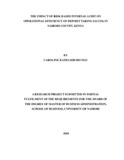The Impact of Risk Based Internal Audit on Operational Efficiency of Deposit Taking Saccos in Nairobi County, Kenya

View/
Date
2018Author
Riungu, Caroline; K
Type
ThesisLanguage
enMetadata
Show full item recordAbstract
Organizations are facing changes in every aspect of their operations in terms of emerging
technologies and processes. This has led to emergence of new business risks which
previously were not in existence. These developing trends have forced enterprises to
redevelop their strategies and reconsider the internal auditing’s importance. Risk based
internal auditing has materialized as a key enabler of efficient risk management. There
are critical benefits that accrue to the firms that pursues operational efficiency such as
achieving higher profits margins, customer satisfaction and seamless process. The
purpose of this research was to explore the effect of risk based internal auditing on
operational efficiency of deposit taking SACCOs in Nairobi county. The target population
of the research was the 42 DTS operating in Nairobi county. A questionnaire rated on the
5-point likert scale was used to obtain responses from internal auditors, finance managers
and chief executive officers. The study targeted a total of 126 responses, out of these 103
filled and returned the questionnaire. Secondary data was obtained from SACCOs
financial statements. Tables and charts aided in exhibiting the information to enhance
presentation of results that have been analyzed to enable interpretation. The study found
out by use of regression model on the study variables, the dependent variable being
operational efficiency and the independent variable being risk based internal audit
measured in terms of variables for instance risk evaluation, internal audit competence,
risk-based planning as well as internal auditing standards. 18.4% of sources of
operational efficiencies in the DTS may possibly be as result of joint effects of the
predictor variables. The research design was descriptive. The research adopted one-way
ANOVA to establish the significance of the regression model from which a 0.001227
probability value was determined. The study concluded that DTS that are promoting
usage of risk based internal audit has positive influence on the operational efficiency
through increased profitability, business turnover and volume of sales. The study suggests
further survey on other competitive strategies that organizations can apply to enhance
operational efficiencies by focusing on other sectors.
Publisher
University of Nairobi
Rights
Attribution-NonCommercial-NoDerivs 3.0 United StatesUsage Rights
http://creativecommons.org/licenses/by-nc-nd/3.0/us/Collections
The following license files are associated with this item:

